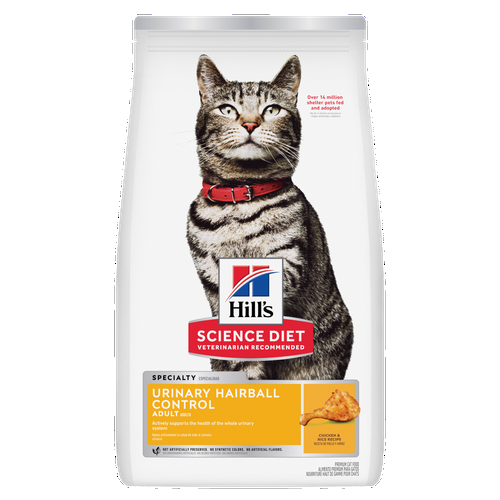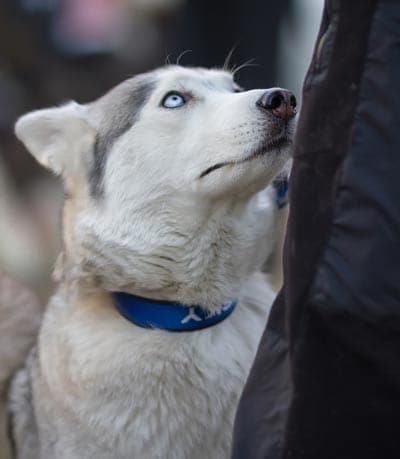
-
Find the right food for your petTake this quiz to see which food may be the best for your furry friend.Find the right food for your petTake this quiz to see which food may be the best for your furry friend.Featured products
 Hill's Science Diet Adult Oral Care Chicken, Brown Rice & Barley Recipe Dog Food
Hill's Science Diet Adult Oral Care Chicken, Brown Rice & Barley Recipe Dog FoodClinically proven kibble technology to reduce plaque & tartar build-up
Shop Now Adult Small & Mini Lamb Meal & Brown Rice Recipe Dog Food
Adult Small & Mini Lamb Meal & Brown Rice Recipe Dog FoodFor the faster metabolism of Small & Mini dogs
Shop Now Adult 7+ Small & Mini Chicken & Brown Rice Recipe Dog Food
Adult 7+ Small & Mini Chicken & Brown Rice Recipe Dog FoodFor the unique nutritional needs of mature Small & Mini dogs
Shop NowFeatured products Adult Indoor Chicken Recipe Cat Food
Adult Indoor Chicken Recipe Cat FoodSupports energy level and beautiful fur in indoor cats
Shop Now Hill's Science Diet Adult Sensitive Stomach & Skin Dog Food
Hill's Science Diet Adult Sensitive Stomach & Skin Dog FoodHighly digestible recipe, gentle on stomachs. Nourishes skin & promotes a lustrous coat
Shop Now Adult Urinary Hairball Control Chicken & Rice Recipe Cat Food
Adult Urinary Hairball Control Chicken & Rice Recipe Cat FoodActively supports the health of the whole urinary system
Shop Now -
Featured articles
 My Pet Ate a Lizard — What Should I Do?
My Pet Ate a Lizard — What Should I Do?Learn what to do if your pet eats a lizard, including whether they can be toxic and symptoms to keep an eye on when they've swallowed one.
Read More 15 Pet-Friendly Cities Ideal for a US Road Trip
15 Pet-Friendly Cities Ideal for a US Road TripCheck out our list of pet-friendly U.S. cities that are excellent travel options, offering off-leash dog parks and pet-friendly restaurants & hotels.
Read More Easy DIY Dog & Cat Toys: Nine of Our Favorites
Easy DIY Dog & Cat Toys: Nine of Our FavoritesBrowse this comprehensive guide for several of our favorite DIY dog and cat toys that are sure to put a little pep in your pet's step.
Read More -


These days, you’ll find entire aisles at the grocery store dedicated to foods that are “free” of one thing or another. From sugar free to dairy free, to gluten free, consumers are gobbling up these specialty foods to uphold a perceived "healthier” and “more natural" nutrition for themselves… as well as their pets.
Interest in more healthful nutrition has rolled right into the pet aisle, and why wouldn’t it? Your dog is a member of your family, after all, and they deserve to be just as healthy as you. Among the recent trends in pet food is grain-free dog food, but contrary to popular belief, allergies and intolerances to grains are rare in our canine companions.
Should dogs eat grains? The truth is that grains have a purpose in dog foods to provide a variety of important nutrients that dogs need.
Bottom line, grain-free dog food isn't necessarily better for your pup. Here are some common grains used in dog food and why you should consider keeping them in his dish.
Common Grains Used in Dog Foods
When looking at the list of ingredients in your dog's food, you might see grains such as:
- Barley
- Corn
- Oats
- Rice
- Wheat
- Rye
- Sorghum
You may be familiar with most of these grains, as some of them are just as popular for your own consumption. Some, like barley, have been described as a " superfood." Barley is high in fiber, both the soluble and insoluble kind. Oats are known for their benefit to heart health in people when eaten as part of a healthy diet and lifestyle.
Do these ingredients have the same benefits for dogs? Should dogs eat grains?

Whole grains such as corn provide dogs with important digestible nutrients including energy, protein, vitamin E and linoleic acid. It is those nutrients that are crucial to a dog's overall health. The most important thing to remember is to choose a food that provides your dog with complete and balanced nutrition. This is true whether or not the food contains grains.
Grain-Free Isn't Carb-Free
Veterinarians also frequently hear confusion from pet parents regarding grain-free and low-carb foods. Grain free and low carb do not go hand in hand. To replace grains, grain-free pet foods often use ingredients such as potatoes, sweet potatoes, lentils, quinoa and peas. In fact, some grain-free pet foods contain carbohydrate levels similar to or even higher than dog food containing grains.


Tasty Tips
Allergies and Grains
Veterinary Practice News interviewed four board-certified vet nutritionists about allergies and the role grains play in them. The nutritionists told the magazine corn, wheat and soy are rarely the cause of food allergies.
"I honestly don't know where that got started. It's not based on any data, and there are excellent foods that contain one or more of those items," said Cailin Heinze, MS, VMD, and a diplomat of the American College of Veterinary Nutrition.
Clinically speaking, the most common food allergens are beef and dairy, with only 10 percent of all pet allergy cases being caused by food at all. Most pets actually have reactions to the world around them, like pollen from grass, trees, molds and fleas, not foods. If you suspect your dog suffers from an allergic reaction — either environmental, food, or a combination of the two — talk with your vet about the issues your poor pal is experiencing. Then, under consistent professional treatment, you can determine if he has a food allergy and to which ingredient your pup is reacting adversely through some careful food trials.
The Right Grain-Free Food for Your Dog
In the rare case where a dog is, in fact, sensitive to grain, you should first talk to your pet's veterinarian and they may recommend a special food or a high-quality, grain-free dog food that still provides balanced nutritional content. Again, your veterinarian can be a great resource for a recommendation.
How do you know if what you're feeding your dog is high in quality?
Like humans, dogs can have their own unique nutritional needs. When choosing the right dog food for your furry friend, make sure to talk with your vet and do your research before committing, so you can find the right balance that meets your pup's needs.
REFERENCE:
1Eckstein, S. (n.d.). Caring for a Dog with Food Allergies. Retrieved August 1, 2019, from https://pets.webmd.com/dogs/guide/caring-for-a-dog-that-has-food-allergies#1


Kara Murphy is a freelance writer and pet parent who lives in Erie, Pa. She has a goldendoodle named Maddie.
Related products

For the faster metabolism of Small & Mini dogs

For the unique nutritional needs of mature Small & Mini dogs

Improves everyday ability to get up & go

Clinically proven kibble technology to reduce plaque & tartar build-up
Related articles

Understand the role that Omega-6 and Omega-3 fatty acids play in your dog's overall health, and how you can ensure they are getting enough.

Learn basic steps & precautions for treating a cut on your dog, including what you can put on the cut, and when you should take them to the vet.

Discover how the field of dog science is giving us more and more insights into the inner workings of our furry best friends.

Your dog's coat and skin are a big part of your dog's overall health. Ensure you keep your dog's coat healthy, by following these simple tips.

Put your dog on a diet without them knowing
Our low calorie formula helps you control your dog's weight. It's packed with high-quality protein for building lean muscles, and made with purposeful ingredients for a flavorful, nutritious meal. Clinically proven antioxidants, Vitamin C+E, help promote a healthy immune system.
Put your dog on a diet without them knowing
Our low calorie formula helps you control your dog's weight. It's packed with high-quality protein for building lean muscles, and made with purposeful ingredients for a flavorful, nutritious meal. Clinically proven antioxidants, Vitamin C+E, help promote a healthy immune system.

